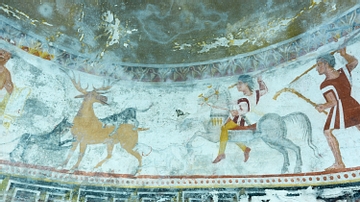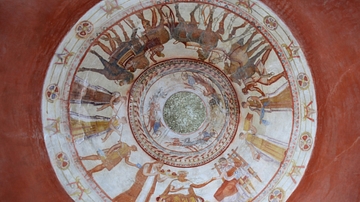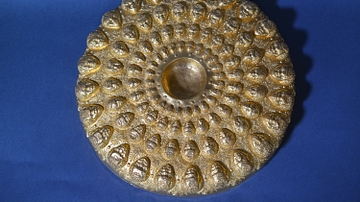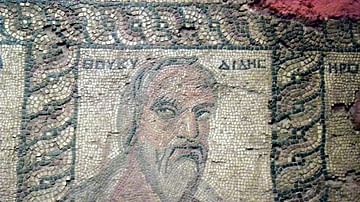Search
Did you mean: Horace?
Search Results

Image
Painted Burial Chamber, Haskovo
A detail of a painted dromos and dome camera from a tumulus near Aleksandrovo village, Haskovo district, Bulgaria. The dromos has battle scenes while the burial chamber has a hunting scene, unfolded in a circle, and in the lower register...

Image
Painted Tomb, Kazanlak
Tomb in the town of Kazanlak, Bulgaria. Painted in dromos and dome camera.
Dromos - scene with battle scenes
Dome camera - a scene with a symposium
Beginning of the 3rd century BCE.
Photographer: Marin Karavelov (used with permission)

Image
Gold Phiale from the Panagyurishte Treasure
Gold phiale (shallow bowl) from the Panagyurishte treasure, early 3rd century BCE. National Historical Museum - Sofia/Plovdiv Archaeological Museum Photography: Oleg Konstantinov, Plovdiv Regional Historical Museum, Bulgaria (used with...

Definition
Ares
Ares was the Greek god of war. He was perhaps the most unpopular of all the Olympian gods because of his quick temper, aggressiveness, and unquenchable thirst for conflict. Ares famously seduced Aphrodite, unsuccessfully fought with Hercules...

Definition
Third Crusade
The Third Crusade (1189-1192 CE) was launched to retake Jerusalem after its fall to the Muslim leader Saladin in 1187 CE. The Crusade was led by three European monarchs, hence its other name of 'the Kings' Crusade'. The three leaders were...

Definition
Huns
The Huns were a nomadic tribe prominent in the 4th and 5th century whose origin is unknown but, most likely, they came from "somewhere between the eastern edge of the Altai Mountains and the Caspian Sea, roughly modern Kazakhstan" (Kelly...

Definition
Scythians
The Scythians were a nomadic people whose culture flourished between the 7th and 3rd century BCE in a territory ranging from Thrace in the west, across the steppe of Central Asia, to the Altai Mountains of Mongolia in the east. This covers...

Definition
Darius I
Darius I (l. c. 550-486 BCE, r. 522-486 BCE), also known as Darius the Great, was the third Persian King of the Achaemenid Empire. His reign lasted 36 years, from 522 to 486 BCE; during this time the Persian Empire reached its peak. Darius...

Definition
Paris Peace Conference - How WWI's Victors Reshaped the World
The Paris Peace Conference, held from January 1919 to January 1920 and attended by the victorious Allied powers, debated and agreed the terms of the peace settlement that formally ended the First World War (1914-18). As four empires were...

Definition
Thucydides
Thucydides (c. 460/455 - 399/398 BCE) was an Athenian general who wrote the contemporary History of the Peloponnesian War between Athens and Sparta, which lasted from 431 BCE to 404 BCE. However, Thucydides' History was never finished, and...